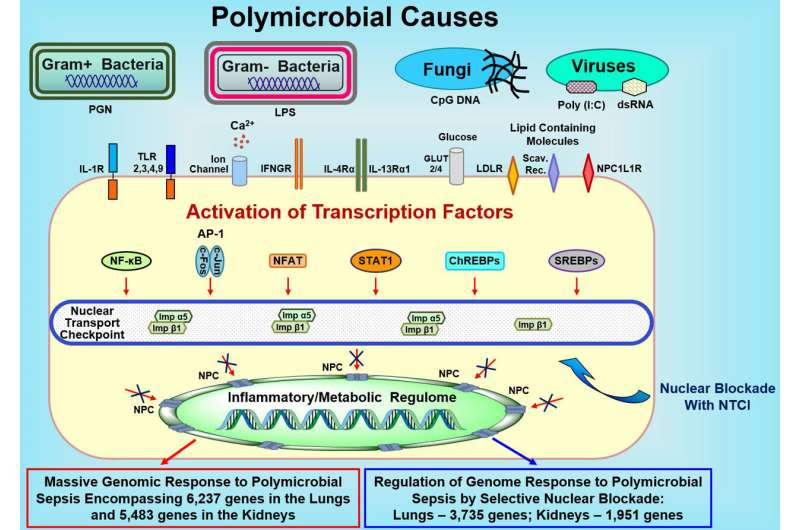This article has been reviewed according to Science X's editorial process and policies. Editors have highlighted the following attributes while ensuring the content's credibility:
fact-checked
peer-reviewed publication
trusted source
proofread
Study reveals genomic code for sepsis in the lungs and kidneys

Researchers at Vanderbilt University Medical Center and the Nashville Veterans Affairs Medical Center have "cracked" the genomic code for sepsis in the lungs and kidneys.
They have demonstrated, in an animal model, how a cell-penetrating drug they developed in their lab can control the devastating inflammatory response to out-of-control infection that is the hallmark of sepsis.
Reporting August 11 in the journal Frontiers in Immunology, they found that sepsis caused a "massive genomic response" to infection, altering the expression of 6,237 genes in the lungs, the site of acute respiratory distress syndrome, and 5,483 genes in the kidneys, the site of acute kidney injury.
Remarkably, injections of their peptide drug, cSN50.1, "reprogrammed" the expression of 3,735 sepsis-induced genes in the lungs and 1,951 in the kidneys. This approach "paves the way for the potentially effective treatment of sepsis, one of the most prevailing and challenging complications of severe infections worldwide," the researchers concluded.
The findings are the culmination of more than 25 years of research, and represent the group's "opus magnus," said Jacek Hawiger, MD, Ph.D., the paper's senior author.
"The problem of sepsis has been close to my heart and mind for the past two-and-a-half decades, since my mother succumbed to sepsis as a complication of stroke," he noted.
An international authority on inflammation as the mechanism of multiple diseases, Hawiger is the Louise B. McGavock Chair, Distinguished Professor of Medicine, and professor of Molecular Physiology and Biophysics at Vanderbilt.
The paper's first two co-authors, Huan Qiao, MD, Ph.D., and Jozef Zienkiewicz, Ph.D., as well as Yan Liu, MD, MS, are long-time research colleagues of Hawiger's.
"Their remarkable prowess in molecular biology, chemical biology of nuclear transport, genomics, and experimental models of human diseases mediated by inflammation contributed to the successful outcome of cracking the genomic code of sepsis in the two major organs, and pharmacologic correction of the 'genomic storm' underlying sepsis," Hawiger said.
Sepsis is rising at an alarming rate around the world, exceeding 49 million cases a year, as bacteria, viruses and other infectious organisms become resistant to the multiple drugs available to control them.
Each year in the United States, at least 1.7 million adults develop sepsis. The nation's annual death toll from sepsis, 350,000, approaches the number of heart attack deaths, and is double the number of deaths from stroke.
The havoc wreaked by sepsis begins in immune and vascular cells, which respond to infection by turning on the expression of genes that produce infection-fighting inflammatory molecules. Like a wildfire, however, this inflammatory response, if unchecked, will damage small blood vessels, resulting in septic shock, multiple organ failure, and death.
In 2014 Hawiger and his colleagues reported that the next-generation, cell-penetrating Nuclear Transport Checkpoint Inhibitor (NTCI) they developed blocked signaling pathways leading to lethal shock in animals exposed to the endotoxin lipopolysaccharide (LPS).
LPS is released during infection by Gram-negative bacteria, the cause of two-thirds of all sepsis cases.
The "parent" peptide of the next series of NTCIs developed in the Hawiger lab, cSN50.1, is a combination of two human protein fragments.
This peptide selectively suppressed transport into the nucleus of transcription factors that turn on the genes responsible for the out-of-control inflammatory response. It also dramatically increased survival in mice exposed to high doses of LPS.
In 2019 the U.S. Food and Drug Administration designated cSN50.1 as an "Investigational New Drug" and allowed a clinical trial in an inflammatory skin disease sponsored by Amytrx, a start-up company co-founded by Hawiger.
The peptide is in phase 2 clinical testing for safety and efficacy in patients with mild to moderate atopic dermatitis (eczema), the most common inflammatory skin disease.
In the current study, which was supported in part by the U.S. Department of Veterans Affairs, the researchers used next-generation sequencing and quantitative reverse transcription techniques to determine the differential expression of thousands of genes in the lungs and kidneys of mice exposed to multiple, sepsis-causing microbes.
Selective blocking of the transcription factors responsible for altering gene expression significantly reduced the spread of bacteria in the blood, lungs, and spleen, without the aid of antimicrobial therapy.
"Cumulatively," the researchers concluded, "identification of the sepsis-responsive host's genes and their control by the selective nuclear blockade advances a better understanding of the multi-system mechanism of sepsis."
The sepsis-activated genes identified in this study are directly relevant to the mechanism, molecular diagnosis, and treatment of ICU-acquired weakness, which delays recovery of patients hospitalized in the intensive care unit, disseminated intravascular coagulation, a serious hematologic complication, and multiple metabolic derangements caused by sepsis, Hawiger said.
Currently, Hawiger and his colleagues are actively investigating these metabolic derangements, and they also are tracking a multitude of sepsis-activated genes in other organs.
More information: Huan Qiao et al, Activation of thousands of genes in the lungs and kidneys by sepsis is countered by the selective nuclear blockade, Frontiers in Immunology (2023). DOI: 10.3389/fimmu.2023.1221102



















